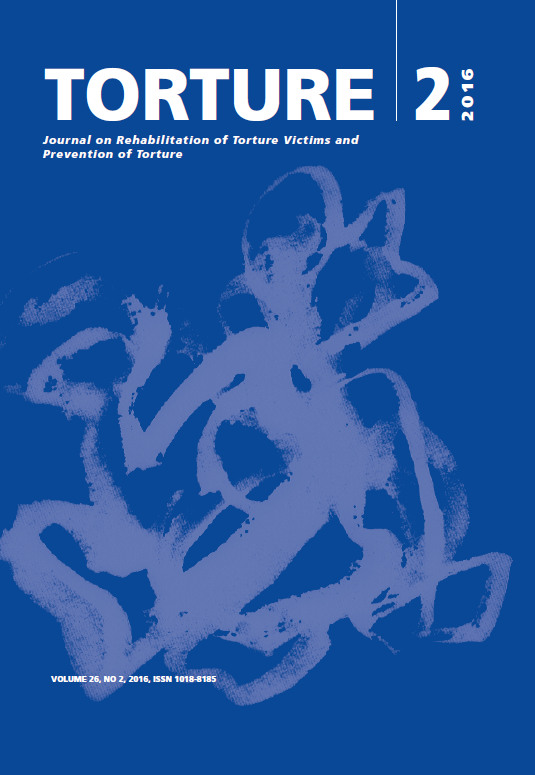Creating community life among immigrant survivors of torture and their allies
DOI:
https://doi.org/10.7146/torture.v26i2.108115Palabras clave:
survivor, refugee, torture, community recovery, psychological sense of communityResumen
This qualitative study describes how immigrant survivors of torture in the United States built relationships among each other to form a psychological sense of community. Eight men and seven women from 11 different countries were recruited through a torture treatment center and a survivor-led advocacy and support coalition. This qualitative study explored how participants described their experiences of community life. An advisory group that included torture survivors, torture treatment practitioners, abolition advocates, and academic experts guided the study. Data was analyzed using inductive and phenomenological theories. The construct of psychological sense of community articulated by McMillan and Chavis1 provided the conceptual framework for the evaluation of how a psychological sense of community was developed. Torture survivors with their allies formed community boundaries based on a deep understanding of the impact of torture. The safety afforded through the community boundaries was reinforced by shared condemnation of torture in all circumstances. Within the security of the community’s boundaries, members shared their experiences to enable their own and others’ recovery from torture. As community members exchanged advice and support, survivors met one another’s needs, providing physical and emotional relief from the effects of their torture. As individuals and a community, they influenced each other’s identities as survivors rather than victims. Advocating for those who remained vulnerable to torture was important to their identification as survivors. Through these exchanges, community members influenced one another and developed trusting relationships and emotional bonds. This study illuminates how community life enabled survivors to contribute to and benefit from, each other’s journeys.
Citas
2. McFarlane CA, Kaplan, I. Evidence-based psychological interventions for adult survivors of torture and trauma: A 30-year review. Transcult Psychiatry. 2012 Jul;49(3-4):539-67.
3. Hutchinson E, Bleiker, R. Emotional reconciliation. Reconstituting identity and community after trauma. EJST. 2008 Aug;11(3):385-403.
4. Gonsalves C J, Torres T A., Fischman Y, Ross J, Vargas, M O. The theory of torture and the treatment of its survivors: An intervention model. J Trauma Stress. 1993 Jul;6, 351-365
5. Anckerman S, Dominguez M, Soto N, Kiaerulf F, Berliner P, Namia Mikkelsen E. Psycho-social support to large numbers of traumatized people in post-conflict societies: An approach to community development in Guatemala. J Community Appl Soc Psychol. 2005 Mar;15(2):136–152.
6. Ginzburg K, Neria Y. Mental health interventions for survivors of torture: Current status and future directions. Z Psychol [Internet]. 2011;219(3):187-189. DOI: 10.1027/2151-2604/ a000068
7. Berliner P, Mikkelsen, EN. Psycho-education with asylum seekers and survivors of torture. Int J Adv Couns. 2006 Sep;28(3):289 –301.
8. Lueger-Schuster, B. Supporting interventions after exposure to torture. Torture. 2010;20(1):3244.
9. Rauchfuss K, Schmolze, B. Justice heals: The impact of impunity and the fight against it on the recovery of human rights violations’ survivors. Torture. 2008;18(1):38-50.
10. Kira IA, Ahmed A, Mahmoud V, Wassim F. Group therapy model for refugee and torture survivors. Torture. 2010;20(2):108-13.
11. Greenfield EA, Marks NF. Sense of community as a protective factor against long-term psychological effects of childhood violence. Soc Serv Rev. 2010 Mar 1;84(1):129-147.
12. Sonn CC, Fisher AT. Psychological sense of community in a politically constructed group. J Community Psychol. 1996 Oct;24(4):417–430.
13. Davidson WB, Cotte PR. Sense of community and political participation. J Community Psychol. 1986; 17(2):119–125.
14. Wiesenfeld E. The concept of “we”: A community social psychology myth? J Community Psychol. 1996 Oct;24(4):337–346.
15. Nowell B, Boyd N. Viewing community as responsibility as well as resource: Deconstructing the theoretical roots of psychological sense of community. J Community Psychol. 2010 Sep;38(7):828–84.
16. Strauss A, Corbin, J. Basics of qualitative research: Techniques and procedures for developing grounded theory. Thousand Oaks, CA: Sage Publications; 1998.
17. Ponterotto JG. Qualitative research in counseling psychology: A primer on research paradigms and philosophy of science. J Couns Psychol. 2005 Apr;52(2):126-136.
18. Fabri M, Joyce M, Black, M, Gonzalez, M. Caring for torture survivors: The Marjorie Kovler Center. In: C Stout, editor. The New Humanitarians: Inspiration, Innovations, and Blueprints for Visionaries. Westport, Connecticut, London: Praeger; 2009.
19. World Health Organization. Mental health: A state of well-being [Internet]. 2014. [updated August 2014]. Available from: http://www.who.int/ features/factfiles/mental_health/en/.
20. Wind TR, Komproe IH. The mechanisms that associate community social capital with postdisaster mental health: A multilevel model. Soc Sci Med. 2012 Nov;75(9):1715-20.
21. Keys C, McConnell E, Motley D, Liao L, McAuliff K. The what, the how and the when of empowerment: Reflections on an intellectual history. In Bond M, Serrano-García I, Keys C, editors. Handbook of Community Psychology. Washington DC: American Psychological Association. Forthcoming 2017.
22. Bloom S L. By the crowd they have been broken, by the crowd they shall be healed: The social transformation of trauma. In Tedeschi R, Park C, Calhoun L, editors. Post-Traumatic Growth: Theory and Research on Change in the Aftermath of Crises. Mahwah, NJ: Lawrence Erlbaum; 1998.
23. Obst P, White K. Choosing to belong: The influence of choice on social identification and psychological sense of community. J Community Psychol. 2007 Jan;35(1):77-90.
Descargas
Publicado
Cómo citar
Número
Sección
Licencia
We accept that some authors (e.g. government employees in some countries) are unable to transfer copyright. The Creative Commons Licence Attribution-NonCommercial-NoDerivatives 4.0 International (CC BY-NC-ND 4.0) covers both the Torture Journal and the IRCT web site. The publisher will not put any limitation on the personal freedom of the author to use material contained in the paper in other works which may be published, provided that acknowledgement is made to the original place of publication.


